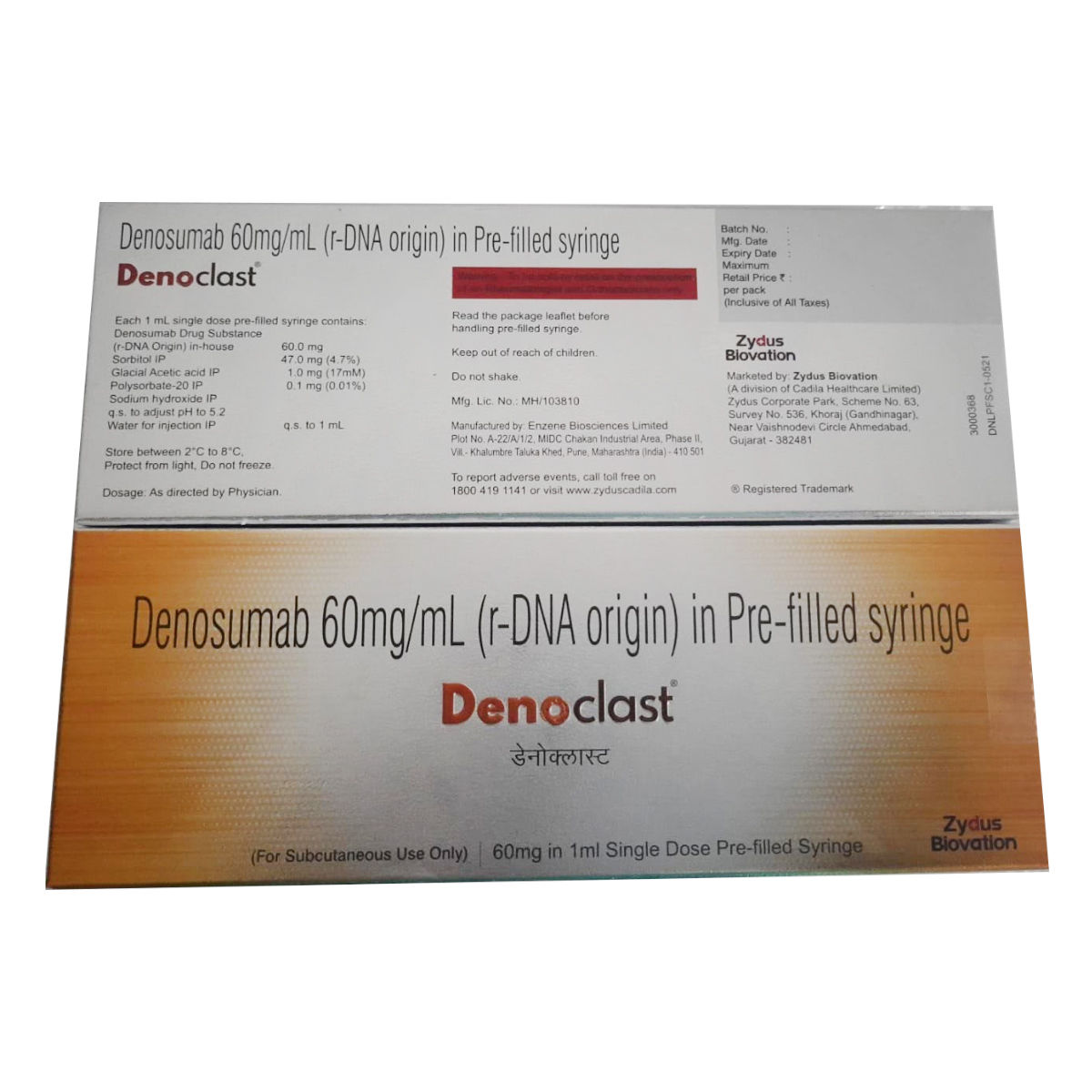Deninta SC Injection
₹16400*
MRP ₹20000
18% off
₹17000*
MRP ₹20000
15% CB
₹3000 cashback(15%)
Free Delivery
With Circle membership
(Inclusive of all Taxes)
This offer price is valid on orders above ₹800. Apply coupon PHARMA10/PHARMA18 (excluding restricted items)
Know Your Delivery Time
Provide Delivery Location

Available Offers
 Prescription drug
Prescription drugWhats That

Secure Payment

India's Most Trusted Pharmacy

Genuine Products
Composition :
Manufacturer/Marketer :
Consume Type :
Return Policy :
About Deninta SC Injection
Deninta SC Injection belongs to a group of medicines called RANK ligand inhibitors used to treat osteoporosis in postmenopausal women and men who have an increased risk of fracture. Deninta SC Injection is also used to treat bone loss due to reduced testosterone level caused by surgery, due to the treatment with medicines such as glucocorticoids and in patients with prostate cancer. Deninta SC Injection may also be used to reduce the risk of fractures in people with multiple myeloma, giant cell tumour of the bone, and to treat high calcium levels caused due to cancer.
Deninta SC Injection contains ‘denosumab’, which works by blocking a receptor in the body that causes bone loss, thereby treats bone loss. Deninta SC Injection treats giant cell tumour of bone (GCTB) by blocking certain receptors in the tumour cells, thereby slowing the tumour growth. Deninta SC Injection helps treat high calcium levels by decreasing bone breakdown as a breakdown of the bones releases calcium. Deninta SC Injection makes the bones stronger and less likely to break.
Deninta SC Injection will be administered by a healthcare professional; do not self-administer. In some cases, you may experience common side-effects such as bone/joint/muscle pain, arm/leg pain, abdominal discomfort, constipation, and painful/frequent urination. You are advised to talk to your doctor if the side effects persist or worsen.
Deninta SC Injection might cause osteonecrosis of the jaw; therefore, maintain good dental hygiene and receive regular dental check-ups whilst on treatment with Deninta SC Injection. Avoid taking Deninta SC Injection if you are pregnant. Consult your doctor before taking Deninta SC Injection if you are breastfeeding. Deninta SC Injection is not recommended for children below 18 years as safety and effectiveness have not been established. Keep your doctor informed about your health condition and medicines to rule out any interactions.
Uses of Deninta SC Injection
Directions for Use
Medicinal Benefits
Deninta SC Injection belongs to a group of medicines called RANK ligand inhibitors used to treat osteoporosis in postmenopausal women and men who have an increased risk of fracture. Deninta SC Injection is also used to treat bone loss due to reduced hormone levels caused by surgery or due to treatment with medicines in patients with prostate cancer. It is also used to treat bone loss occurring due to long-term treatment with glucocorticoids in patients who are at an increased risk of fractures. Deninta SC Injection may also be used to reduce the risk of fractures in people with multiple myeloma, giant cell tumours of the bone and to treat high calcium levels caused due to cancer. Deninta SC Injection binds to a protein on RANK ligand on osteoclast (cells that cause bone breakdown) and inhibits their formation, functioning and survival. Thereby decreases bone breakdown, increases bone density, and strengthens the bone. Deninta SC Injection treats giant cell tumour of bone (GCTB) by blocking certain receptors in the tumour cells, thereby slows the tumour growth. Deninta SC Injection helps treat high calcium levels by decreasing bone breakdown as the breakdown of the bones releases calcium. Deninta SC Injection makes the bones stronger and less likely to break.
How Deninta SC Injection Works
Storage
Side Effects of Deninta SC Injection
- Bone/joint/muscle pain
- Pain in extremities (arm/leg pain)
- Abdominal discomfort
- Constipation
- Painful/frequent urination
- Upper respiratory tract infection
- Rash
- Eczema
- Hair loss
What if I have taken an overdose of Deninta SC Injection
Drug Warnings
Do not take Deninta SC Injection if you are allergic to any of its components; if you have hypocalcaemia (low levels of calcium in the blood). Inform your doctor if you have low levels of calcium, kidney dysfunction, liver problems, poor dental health, gum problems, weak immune system, hypoparathyroidism (decreased function of the parathyroid gland), malabsorption, latex allergy, undergone thyroid surgery, planned dental procedure, if you are taking glucocorticoids, or cannot take calcium and vitamin D supplements. Avoid taking Deninta SC Injection if you are pregnant. Consult your doctor if you are breastfeeding. Deninta SC Injection is not recommended for children below 18 years as safety and effectiveness have not been established.
Diet & Lifestyle Advise
- Include dairy products like milk, yoghurt, cheese, or milk-based custard in your diet.
- Eat daily a serving of broccoli, cabbage, bok choy (Chinese white cabbage), spinach, and other green leafy vegetables.
- Snack on calcium-rich nuts like Brazil nuts or almonds.
- Sprinkle sesame seeds over your food, vegetables, and salads. Sesame seeds are high in calcium.
- Avoid or reduce the intake of caffeine, soft drinks, and alcohol as they may inhibit calcium absorption.
- Replace the meat with tofu or tempeh for extra calcium in your food.
Habit Forming
Therapeutic Class
Deninta SC Injection Substitute

Densurank 60 mg PFS Injection 1 ml
₹21195.00per tabletDenuril 60 mg Injection 1's
₹7072.50per tabletDenmab Pre Filled Syringe 1 ml
₹16400.00per tabletDenoci 60 Injection 1 ml
₹12300.00per tabletDenu 60 mg Injection 1 ml
₹7762.50per tablet
Product Substitutes
Alcohol
Caution
It is not known if alcohol interacts with Deninta SC Injection, so please consult a doctor.
Pregnancy
Unsafe
Deninta SC Injection is not recommended during pregnancy as it might cause foetal harm. If you are a woman of child-bearing potential, use effective contraception during the treatment with Deninta SC Injection and for 5 months after discontinuation. Inform your doctor if you are pregnant, think you are pregnant or planning for pregnancy.
Breast Feeding
Caution
Consult your doctor if you are breastfeeding; your doctor will decide if breastfeeding mothers can take Deninta SC Injection or not.
Driving
Safe if prescribed
Deninta SC Injection generally does not affect your ability to drive. However, drive or operate machinery only if you are alert.
Liver
Caution
Please consult your doctor if you have a liver impairment or any concerns regarding this.
Kidney
Caution
Please consult your doctor if you have kidney impairment or any concerns regarding this.
Children
Unsafe
Deninta SC Injection is not recommended for children below 18 years as safety and effectiveness were not established.
FAQs
Country of origin
Disclaimer
Author Details
We provide you with authentic, trustworthy and relevant information















